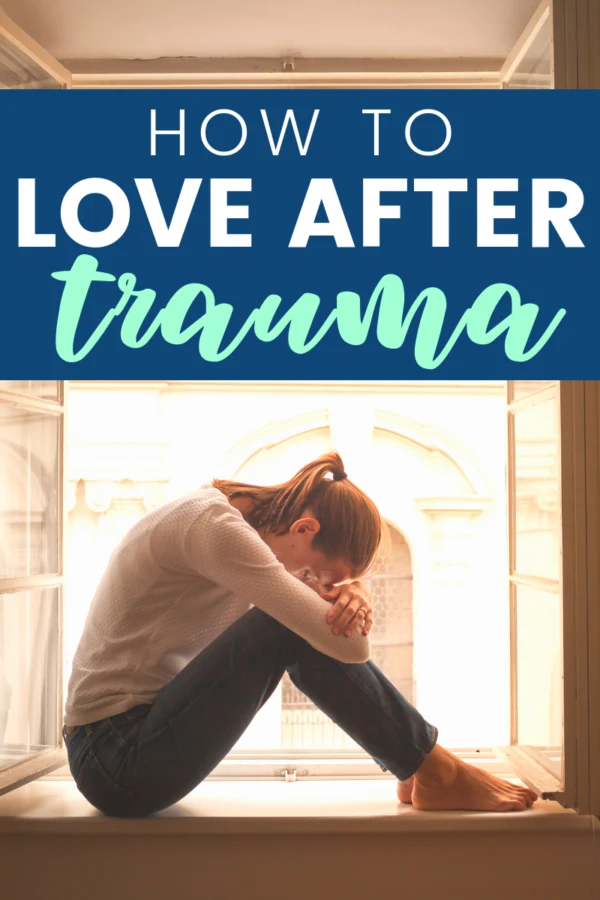We've all experienced some sort of trauma in our lives, some deeper than others. In this guide, you'll learn how to love after trauma. Learning to love yourself, forgive, and heal is key to living a fulfilled and happy life.
Finding self-love after a traumatic event can seem like a near-impossible objective on the most difficult of days.
Emotional trauma is a thought-provoking, vicious cycle of events that often requires time, self-reflection, and forgiveness to begin the journey of healing.
During my own journey of healing, I have found that following emotional practices to be invaluable to my everyday inner harmony when the tides are most high.

Learn to Love After Trauma
I've been through my fair share of trauma, physical and emotional. In fact, there are many stories that I haven't share with you yet. If there's one thing that is steady, it's my ability to heal and open myself back up unconditional love.
You are fully capable of doing that, too.
Using this guide to love after trauma, you'll not only learn how to love yourself and others again, you'll become a person that others admire.
1. Acceptance
Understand that the events that caused your emotional trauma have passed, and the worst is over. Allow this thought to bring you relief rather than induce more stress and anxiety.
2. Care
Gift yourself an internal daily ritual in the form of self-love and care, such as repeating positive affirmations and smiling at your beautiful reflection.
3. Recognition
Give yourself praise for your accomplishments, from the littlest of victories to the biggest of celebrations. You are worth the recognition that you may not often give yourself. You are worth it!
4. Open your Heart
It is often difficult to trust others after traumatic experiences, whether they are strangers or loved ones whom you once trusted. Believe in the fact that good, heart-centered people DO exist, and you will find them in the least likely of places.
5. Move Forward
Constant fear of the unknown will lengthen your healing process and often surface past doubts about the world. Believe in the power of community and lean towards a fresh outlook on life and a new beginning.
6. Find Support
Find a healthy and understanding support system that you can rely on during the good and bad days. Having quality people around when you’re feeling vulnerable will allow you to develop a deeper trust within yourself and others.
7. Inspire Healthy Relationships
Whether you create new friendships, find new love, or rekindle a past relationship, look forward to others loving you for who you truly are.
8. Be your Own Advocate
You know yourself better than anyone else, so always have your own back. Only you know what is truly best for you. Come forward and accept only the best treatment you can receive from others and yourself.
9. Inhale Confidence; Exhale Doubt
Allow the intense emotions to exit your body. Then, inhale and fill your lungs and heart with confidence, forgiveness, and a new purpose in your life. You are beautiful, lovable and worthy.
10. Become a Positive Thinker
Using various tools and positive thinking exercises, you can learn how to train your mind to go to a happy place. Doing so, you will leave self-doubt in the past, allowing you to move forward in learning how to fully love after trauma.
Every person whom has experienced any form of trauma deserves the opportunity to heal themselves, rediscover self-love, and find the capacity to fully love others.
Your feelings of heartache, self-doubt, and fear of the future are relevant. However, the trauma you have endured is in no way YOUR fault, no matter how other people – including those involved in your past traumatic experiences – shape it to be.
You truly can be on the road to healing by practicing these healthier mindsets and self-reflections.

[…] an empath is told to “get over” a traumatic event or heavy emotions, we feel as if our emotions or […]
[…] negatively impact your life. For example, you could damage relationships, creating emotional or physical trauma for yourself or […]
[…] experienced anxiety throughout my entire life as an adult. Maybe it was childhood trauma contributing to these difficult feelings. Either way, I know it feels unmanageable, frustrating, […]
[…] people experience a traumatic event that completely alters the core of a person’s soul. You may feel anger, confusion, and doubt of […]
[…] your anger can negatively impact your life. For example, you could damage relationships, creating emotional or physical trauma for yourself or […]